Social Welfare
From Grassroots to Glory
Sports Transformation for ‘Viksit Bharat 2047’
Posted On:
28 AUG 2025 2:50PM
When I see an environment of encouragement for sports within the families of my country, my heart swells with pride. I regard this as a most auspicious indication for the nation’s future.” – PM Narendra Modi, August 15, 2025
|
Key Takeaways
|
- Youth Centric Vision: With 65% of India's population under 35, the government has positioned sports as a core pillar of youth empowerment. The Ministry of Youth Affairs and Sports received a record allocation of ₹3,794 crores for FY 2025-26 (a 130.9% increase since 2014-15), making sports central to the Viksit Bharat 2047 vision.
- Sports as a Catalyst for Growth: Flagship initiatives like Khelo India, TOPS, Fit India, and KIRTI are nurturing grassroots talent, promoting fitness as a Jan Andolan, and positioning sports as a driver of national pride, economic growth, and global leadership.
- Transformative Sports Governance Reforms: The National Sports Governance Act 2025 introduces landmark changes including mandatory athlete representation, gender inclusion, Safe Sports Policy, and transparency measures that position sports bodies as public authorities under the RTI Act.
|
India stands at a demographic advantage unmatched by most nations, with about 65% of its population under the age of 35, making it a country with the largest youth population in the world.
Recognizing the potential of this demographic dividend, the Ministry of Youth Affairs and Sports aims to play a crucial role in youth development and sports promotion, aiming to steer the nation toward its goal of becoming a Viksit Bharat by 2047. It focuses on personality-building, skill enhancement, and fostering national integration through various initiatives.
The National Sports Day (NSD) 2025 celebrations will be led by the Fit India Mission and organised as a three-day, nation-wide sports and fitness movement from August 29 to 31 under the inspiring theme ‘Ek Ghanta, Khel ke Maidan Main’. The movement seeks to spread awareness about the importance of dedicating at least 60 minutes daily to physical activity for preventing lifestyle diseases. The spirit of NSD 2025 also pays special tribute to Olympic values of Excellence, Friendship, Respect and Paralympic values of Courage, Determination, Inspiration, and Equality. Eminent athletes and public representatives are also set to take part in the celebrations and engage with sports activities in all corners of the nation. Renowned sportspersons will be stepping onto the playgrounds at State capitals as well as across all districts on 29th August.
Major Dhyan Chand: Inspiring Generations of Youth through Sport
The importance of sports in India finds its enduring symbol in Major Dhyan Chand, whose birth anniversary on August 29 is celebrated as National Sports Day[1]. Widely regarded as one of the greatest hockey players, Dhyan Chand was known for his exceptional ball control and goal-scoring abilities, earning him the titles "The Hockey Wizard" and "The Magician". Major Dhyan Chand represents the spirit of focus, humility, and national pride that continues to inspire generations of young sportspersons.
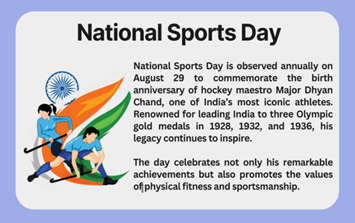
Key Sports Initiatives
The Government of India views sports as a core pillar of youth empowerment and nation-building. To advance this vision, the central government has made a record allocation of Rs. 3,794 crores to the Ministry of Youth Affairs and Sports for FY 2025–26. A major portion, that is Rs. 2,191 crores, has been allocated to Central Sector Schemes, the budget allocations to the ministry in the FY 2014-15 were ₹1643 crore, marking a rise of 130.9% in 2025-26.
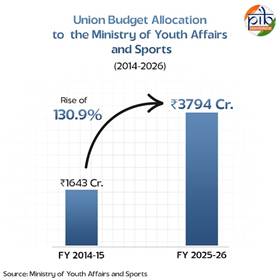
Sports Authority of India
Sports Authority of India (SAI) under the aegis of the Ministry of Youth Affairs & Sports has been entrusted with the twin objectives of promoting sports and achieving sporting excellence at the national and international level.
Aims and Objectives:
- Talent Scouting at micro level & Nurturing talent towards excellence
- Training & International Exposure
- Support Training with Scientific & Sports Equipment and scientific personnel
- Monitor and enhance Performance with a scientific evaluation system
- Training and preparation of National teams
- Sports Infrastructure Development & Maintenance
- Maintenance and up gradation of 4 stadia complexes and a shooting range in Delhi
- To produce coaches and physical educationists of high caliber in different disciplines of sports to broad base sports
- To implement various schemes of the MYAS e.g. Khelo India, Assistance to NSF, TOPS, FIT India[2]
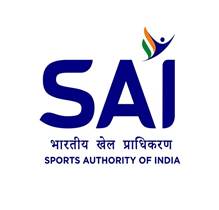
National Sports Governance Act, 2025
The National Sports Governance Act, 2025, enacted on August 18, 2025, represents a landmark reform in Indian sports administration. The Act was introduced to establish a unified framework that ensures transparency, accountability, ethics, and athlete welfare in line with the Olympic Charter, Paralympic Charter, and global best practices.
The Act, places strong emphasis on athlete protection. For the first time, sports bodies are required to adopt a Safe Sports Policy safeguarding women, minor athletes and other vulnerable persons, alongside a Code of Ethics aligned with international norms. Additionally, every National Sports Body shall establish an internal grievance redressal mechanism to address the grievances raised by athletes, coaches and other individuals associated with such body, in a fair, timely and transparent manner.
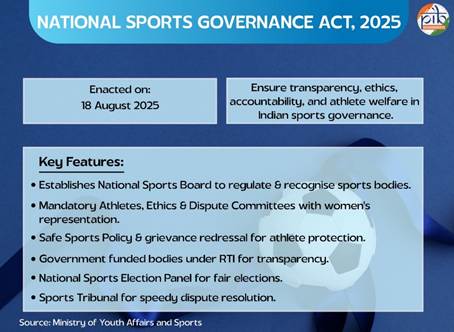
The Act also introduces structural reforms in governance. It fixes age and tenure limits for office bearers, with conditional relaxation (70–75 years if permitted by international federation statutes), ensuring generational renewal in leadership. Further, in cases of governance crises, it allows the appointment of experienced Sports Administrators in place of retired judges previously appointed by courts
Khelo Bharat Niti 2025
Launched in July 2025, Khelo Bharat Niti 2025 marks a paradigm shift in India's sports ecosystem. Building on the foundation laid by programmes like Khelo India, the policy aims to transform sports into a nationwide movement and a viable career path, aligned with the goals of Viksit Bharat and the aspiration to host the 2036 Olympics[3].
The policy integrates sports with the National Education Policy (NEP) 2020, strengthens infrastructure at grassroots and elite levels, and institutionalises early talent identification through programmes like KIRTI.
Key elements include:
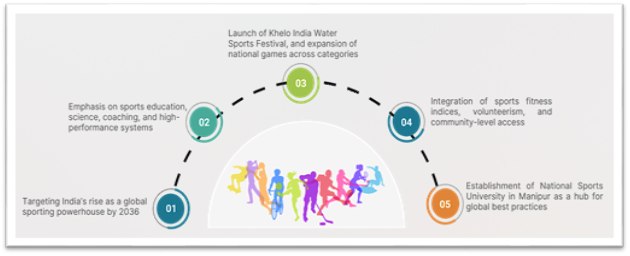
Khelo Bharat Niti is more than a policy—it is a national commitment to nurturing talent, inspiring participation, and positioning India as a leading sporting nation.
Khelo India – National Programme for Development of Sports
Launched in FY 2016-17, the Khelo India – National Programme for Development of Sports aims to promote mass participation and sporting excellence in both rural and urban areas. The scheme, carried forward strongly by the government, received an extension for five years in 2021 with an outlay of ₹3,790.50 crore, reinforcing Prime Minister Modi’s vision of nurturing a sporting culture across the nation. Key achievements include:
- Approval of 328 new sports infrastructure projects worth ₹3,151.02 crore.
- Establishment of 1,045 Khelo India Centres (KICs) for grassroots training and support.
- Notification of 34 Khelo India State Centres of Excellence (KISCEs) and accreditation of 306 academies.

Support for 2,845 Khelo India Athletes (KIAs) with coaching, equipment, medical care, and a monthly out-of-pocket allowance of Rs 10,000.
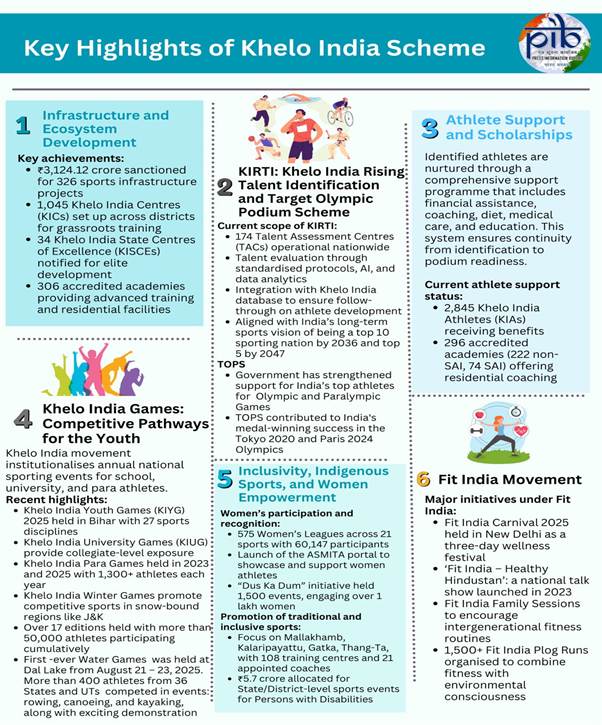
Source: India’s Sporting Transformation Building Champions, Inspiring a Nation, PIB; Annual Report 2023-2024, Ministry of Youth Affairs and Sports
KIRTI (Khelo India Rising Talent Identification)
KIRTI is a nationwide initiative to identify and nurture sporting talent among children aged 9 to 18. The program uses Talent Assessment Centres (TACs) across the country, standardized protocols, and advanced IT tools (including AI and data analytics) for transparent, merit-based selection. There are 174 TACs in the country as of present. This initiative reflects vision of building a strong pipeline of young athletes who can take India to greater heights in global sports.
KIRTI aims to create a sustainable pipeline of athletes to help India become a top-10 sporting nation by 2036 and top-5 by 2047.
Target Olympic Podium Scheme (TOPS)
The government has strengthened support for India’s top athletes in their preparations for the Olympic and Paralympic Games. Selected athletes are supported with funding from National Sports Development Fund (NSDF) for customized training and other support not available under normal schemes of the Ministry. Out of pocket allowance (OPA) is paid at Rs. 50,000/- per month to Core group athletes. Further, a Development Group was added to support junior athletes with a stipend of Rs. 25,000/- per month. TOPS contributed to India's medal-winning success in the Tokyo 2020 and Paris 2024 Olympics, showcasing the government’s commitment to making India a global sporting powerhouse.
As of August 2024, 174 individual athletes & 2 hockey teams (Men & Women) as core group have been selected under the scheme.
FIT India Movement
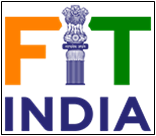
Fit India Movement was launched with a view to make fitness an integral part of our daily lives. The mission of the movement is to bring about behavioural changes and move towards a more physically active lifestyle, reflecting Prime Minister Modi’s call for a Jan Andolan (people’s movement) for fitness.
The movement has achieved several key milestones, including a special online series titled, 'Fit India- Healthy Hindustan' Programme, by eminent fitness experts and Fit India icons, was launched in 2023.
Fit India Family Sessions were also conducted with experts with the objective of inculcating fitness routine amongst families.
Assistance to National Sports Federations (NSFs)
This scheme enables National Sports Federations to strengthen the ecosystem of competitive sports in India. Support includes the organization of national championships, hosting international events, facilitating Indian athletes’ participation abroad, setting up coaching camps, hiring foreign coaches, and procuring advanced equipment. It aims to provide athletes with structured, professional exposure and training aligned with international standards.
National Sports University
“The National Sports Universities being established in the country and the new National Education Policy, which has made sports a part of mainstream education, are both aimed at producing not only outstanding athletes but also top-tier sports professionals in Bharat.” – PM Narendra Modi
With a transformative vision for sports in India, the Government has prioritized Sports education to foster a robust sports ecosystem, elevating athletics from a pastime to a professional career. The National Sports University, established in 2018 in Imphal, Manipur, is a dedicated institution for sports education in sciences, technology, management, and coaching, doubling as a national training hub for select disciplines by adopting global best practices through MoUs with universities like Canberra and Victoria. This institution focuses on advancing physical education, sports sciences, and elite training, aligning with national goals to nurture global talent.[4]
National Sports Awards
Conferred annually by the President of India on National Sports Day (August 29), these nous awards honour athletes, coaches, and institutions that have significantly contributed to Indian sports. The key awards include:
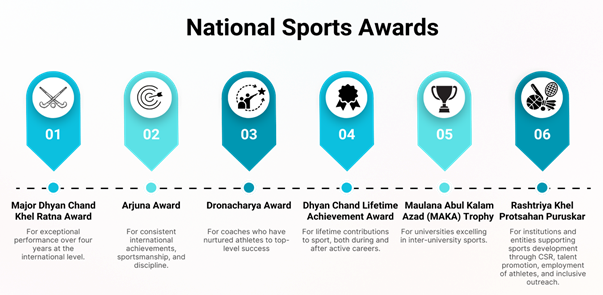
Pension to Meritorious Sportspersons
This scheme ensures financial security for retired athletes who have earned laurels for the country at international events. Eligible sportspersons, on reaching the age of 30 and post-retirement, receive a lifelong monthly pension ranging between ₹12,000 and ₹20,000. This support sustains their well-being beyond their competitive years.
Pandit Deendayal Upadhyay National Welfare Programme for Sportspersons
This welfare programme provides financial assistance—up to ₹10 lakh—to distinguished former athletes who face financial or medical hardship. The assistance covers costs such as medical treatment, purchase of sports equipment, and participation in sporting events. It ensures continued dignity and support for those who once brought honour to the nation.
National Sports Development Fund (NSDF)
The National Sports Development Fund (NSDF) mobilises financial contributions from the private sector, NRIs, and philanthropic organisations. These funds supplement public investment and are used to develop infrastructure, support high-potential athletes, and fund innovative programmes, creating a collaborative model for sports development.
National Centre of Sports Sciences and Research (NCSSR)
Launched in 2017, the National Centre of Sports Sciences and Research (NCSSR) is a specialised initiative to strengthen scientific support for Indian athletes. With a budget of ₹260 crore until 2025–26, it includes the central NCSSR hub and supports six university-based Sports Science Departments and five Sports Medicine Departments in medical institutions. The scheme promotes advanced research, injury prevention, rehabilitation, and performance enhancement through sports science and medicine.
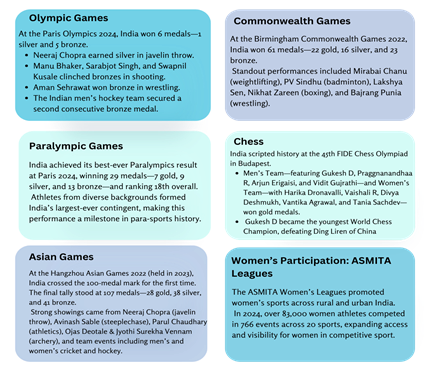
India’s Ascent in The Global Sporting Arena
Olympics
|
Year
|
Host City
|
Indian Athletes
|
Medals Won
|
|
2016
|
Rio de Janeiro
|
117
|
2
|
|
2020
|
Tokyo
|
124
|
7
|
|
2024
|
Paris
|
117
|
6
|
India's Olympic journey witnessed a remarkable transformation between 2016 and 2024, marking a new era of athletic excellence. From a modest haul of 2 medals in Rio 2016 by a 117-member contingent, India surged ahead to claim 7 medals at Tokyo 2020 and maintained a strong showing with 6 medals at Paris 2024, both with contingents of 124-117 athletes. Notable performers in this period include Neeraj Chopra, India’s first Olympic gold medalist (Tokyo 2020) in athletics (javelin), and Mirabai Chanu, a consistent medalist in weightlifting.
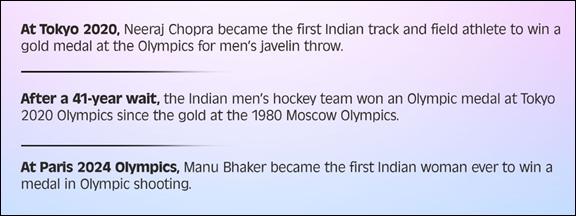
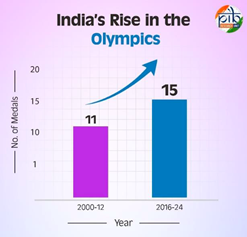
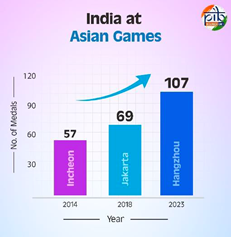
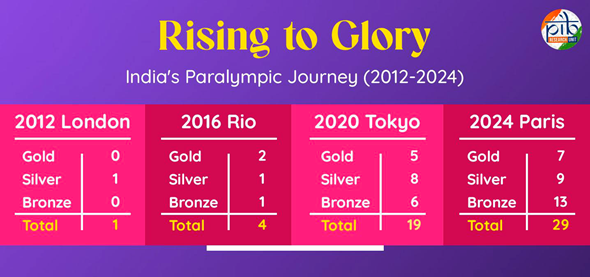
Conclusion
From increased participation to global podium finishes, India’s sports journey has been transformational. With reforms like the National Sports Governance Act 2025 and Khelo Bharat Niti 2025, India is building a robust ecosystem that transforms athletic potential into national and international achievement.
Through athlete-centric governance, scientific training support, and transparent accountability mechanisms, the country is nurturing a generation that will drive both sporting excellence and national progress toward the Olympic Games of 2036 and the Viksit Bharat 2047 vision.
Click here for pdf file
*****
SK/RT
(Explainer ID: 155107)
आगंतुक पटल : 3780
Provide suggestions / comments